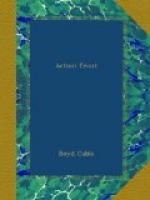When the two emerged from the bank they found the street a good deal quieter than when they had entered it. They walked along towards the main square, noticing that some of the shopkeepers were calmly putting up their shutters, while others quietly continued serving the few customers who were hurriedly completing their purchases. As the two walked along the narrow street they heard the thin savage whistle of an approaching shell and a moment later a tremendous bang! They and everybody else near them stopped and looked round, up and down the street, and up over the roofs of the houses. They could see nothing, and had turned to walk on when something crashed sharply on a roof above them, bounced off, and fell with a rap on the cobble-stones in the street. A child, an eager-faced youngster, ran from an arched gateway and pounced on the little object, rose, and held up a piece of stone, with intense annoyance and disgust plainly written on his face, threw it from him with an exclamation of disappointment.
The two walked on chuckling. “Little bounder!” said one. “Thought he’d got a souvenir; rather a sell for him—what?”
In the main square, they found a number of market women packing up their little stalls and moving off, others debating volubly and looking up at the sky, pointing in the direction of the last sound, and clearly arguing with each other as to whether they should stay or move. A couple of Army Transport wagons clattered across the square. One driver, with the reins bunched up in his hand and the whip under his arm, was busily engaged striking matches and trying to light a cigarette; the other, allowing his horses to follow the first wagon, and with his mouth open, gazed up into the sky as if he expected to see the next shell coming. A few civilians scattered about the square were walking briskly; a woman, clutching the arm of a little boy, ran, dragging him, with his little legs going at a rapid trot. More civilians, a few men in khaki, and some in French uniform, were standing in archways or in shop-doors.
There was another long whistle, louder and harsher this time, and followed by a splintering crash and rattle. The groups in the doorways flicked out of sight; the people in the open half halted and turned to hurry on, or in some cases, without looking round, ran hurriedly to cover. Stones and little fragments of debris clacked down one by one, and then in a little pattering shower on the stones of the square. The last of the market women, hesitating no longer, hurriedly bundled up their belongings and hastened off. The two officers turned into a cafe with a wide front window, seated themselves near this at a little marble table, and ordered beer. There were about a score of officers in the room, talking or reading the English papers. All of them had very clean and very close-shaven faces, and very dirty and weather-stained, mud-marked clothes. For the most part they seemed a great deal more interested in each other, in their conversations, and in their papers, than in any notice of the bombardment. The two who were seated near the window had a good view from it, and extracted plenty of interest from watching the people outside.




